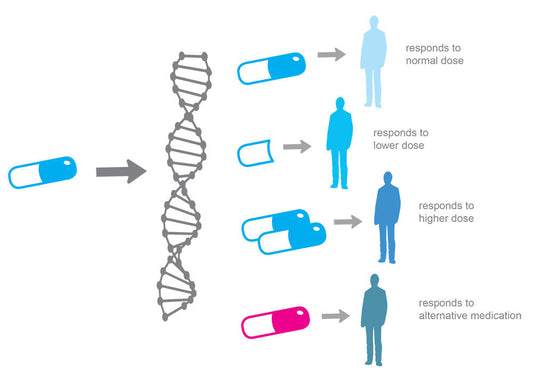What is the Consequence of Having Short Telomeres?
Aging is a natural process that many scientists are beginning to classify as a disease in itself. This classification leads to the appearance of multiple pathologies directly related to old age. One of the major factors associated with aging is the shortening of telomeres. In this article, we'll delve into the consequences of having short telomeres and what we can do to preserve them.
The Role of Telomeres in Aging
2.1. The Telomere Shortening Process
Telomeres are repetitive DNA sequences located at the ends of our chromosomes. They protect the genetic information within our cells from damage during cell division. However, over time and with each cell division, telomeres gradually shorten. When they become too short, the cells enter a state of senescence and cease to divide, eventually leading to aging and age-related diseases.
2.2. Consequences of Short Telomeres
Short telomeres contribute to a range of age-related health issues. They can cause the cells to lose their ability to divide, leading to a decline in tissue function and regeneration. Additionally, short telomeres can increase the risk of chromosomal abnormalities, which may result in diseases and other health complications.
The Impact of Short Telomeres on Health
3.1. Cardiovascular Diseases
Short telomeres have been linked to an increased risk of cardiovascular diseases, such as heart attacks and strokes. They may lead to a decline in the regenerative capacity of the heart, making it more susceptible to damage and dysfunction.
3.2. Neurodegenerative Diseases
Neurodegenerative diseases, such as Alzheimer's and Parkinson's, have also been associated with short telomeres. These diseases involve the progressive loss of neurons, and short telomeres may contribute to the decline in neuronal function and regenerative capacity.
3.3. Cancer
Short telomeres are also implicated in the development of various types of cancer, including prostate, ovarian, and lung cancer. They can result in genomic instability, increasing the risk of mutations and cancer development.
3.4. Diabetes Mellitus
Both type 1 and type 2 diabetes mellitus have been linked to shorter telomeres. Shorter telomeres can affect insulin production and resistance, contributing to the development of diabetes.
3.5. Infertility
Short telomeres can negatively impact fertility by reducing the regenerative capacity of the reproductive system. This can lead to age-related infertility in both men and women.
Preserving Telomeres
4.1. The Role of Telomerase
Telomerase is an enzyme that plays a crucial role in preserving telomeres. As telomomeres shorten with each cell division, telomerase can slightly repair the loss in telomere length. This enzyme adds new DNA sequences to the ends of chromosomes, helping maintain telomere length and cellular health.
4.2. Diet and Supplementation
Improving our diet and incorporating adequate supplementation can help protect our telomeres from shortening more quickly. A balanced diet rich in antioxidants, vitamins, and minerals can reduce oxidative stress and inflammation, which are known to accelerate telomere shortening. Consuming foods high in omega-3 fatty acids, fiber, and various phytonutrients can also contribute to telomere preservation.
4.3. Hyperbaric Chamber Treatment
Hyperbaric chamber treatment involves breathing pure oxygen in a pressurized room or chamber. This therapy has been shown to reduce oxidative stress and improve cellular repair mechanisms, thus helping to prevent telomere shortening. More research is needed to fully understand the impact of hyperbaric chamber treatment on telomere length and aging.
4.4. Ozone Therapy
Ozone therapy is another treatment option that may help preserve telomere length. By introducing ozone into the body, this therapy aims to improve oxygen utilization and reduce inflammation. Ozone therapy has been reported to have positive effects on cellular health, which may contribute to telomere preservation. However, more research is needed to validate these findings and determine the optimal treatment protocols.
Conclusion
The consequences of having short telomeres are far-reaching and can impact various aspects of our health, from cardiovascular diseases to infertility. To maintain healthy telomeres, it's important to focus on a balanced diet, proper supplementation, and consider treatments such as hyperbaric chamber therapy and ozone therapy. Further research on these therapies and other potential interventions will help us better understand how to preserve our telomeres and promote healthy aging.
FAQs
-
What are telomeres? Telomeres are repetitive DNA sequences located at the ends of our chromosomes. They protect genetic information within our cells from damage during cell division.
-
Why do telomeres shorten over time? Telomeres shorten over time due to the natural process of cell division. With each division, a small portion of the telomere is lost, eventually leading to critically short telomeres and cellular senescence.
-
Can telomeres be lengthened? While some interventions, such as lifestyle changes and specific therapies, may help slow down the rate of telomere shortening, there is no definitive evidence that they can significantly lengthen telomeres.
-
How does telomerase help preserve telomeres? Telomerase is an enzyme that can add new DNA sequences to the ends of chromosomes, helping to maintain telomere length and cellular health.
-
What lifestyle factors can help protect telomeres? A balanced diet rich in antioxidants, vitamins, and minerals, along with regular physical activity, stress reduction, and maintaining a healthy body weight, can all contribute to telomere preservation.


















